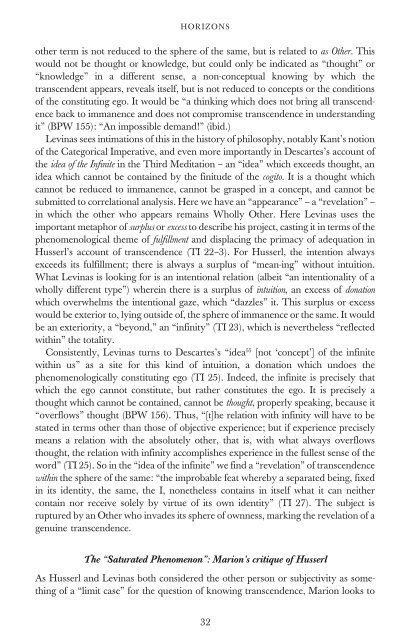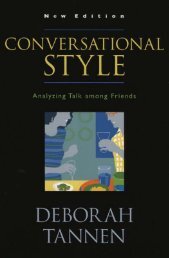Speech and Theology: Language and the Logic of Incarnation
Speech and Theology: Language and the Logic of Incarnation
Speech and Theology: Language and the Logic of Incarnation
Create successful ePaper yourself
Turn your PDF publications into a flip-book with our unique Google optimized e-Paper software.
HORIZONS<br />
o<strong>the</strong>r term is not reduced to <strong>the</strong> sphere <strong>of</strong> <strong>the</strong> same, but is related to as O<strong>the</strong>r. This<br />
would not be thought or knowledge, but could only be indicated as “thought” or<br />
“knowledge” in a different sense, a non-conceptual knowing by which <strong>the</strong><br />
transcendent appears, reveals itself, but is not reduced to concepts or <strong>the</strong> conditions<br />
<strong>of</strong> <strong>the</strong> constituting ego. It would be “a thinking which does not bring all transcendence<br />
back to immanence <strong>and</strong> does not compromise transcendence in underst<strong>and</strong>ing<br />
it” (BPW 155): “An impossible dem<strong>and</strong>!” (ibid.)<br />
Levinas sees intimations <strong>of</strong> this in <strong>the</strong> history <strong>of</strong> philosophy, notably Kant’s notion<br />
<strong>of</strong> <strong>the</strong> Categorical Imperative, <strong>and</strong> even more importantly in Descartes’s account <strong>of</strong><br />
<strong>the</strong> idea <strong>of</strong> <strong>the</strong> Infinite in <strong>the</strong> Third Meditation – an “idea” which exceeds thought, an<br />
idea which cannot be contained by <strong>the</strong> finitude <strong>of</strong> <strong>the</strong> cogito. It is a thought which<br />
cannot be reduced to immanence, cannot be grasped in a concept, <strong>and</strong> cannot be<br />
submitted to correlational analysis. Here we have an “appearance” – a “revelation” –<br />
in which <strong>the</strong> o<strong>the</strong>r who appears remains Wholly O<strong>the</strong>r. Here Levinas uses <strong>the</strong><br />
important metaphor <strong>of</strong> surplus or excess to describe his project, casting it in terms <strong>of</strong> <strong>the</strong><br />
phenomenological <strong>the</strong>me <strong>of</strong> fulfillment <strong>and</strong> displacing <strong>the</strong> primacy <strong>of</strong> adequation in<br />
Husserl’s account <strong>of</strong> transcendence (TI 22–3). For Husserl, <strong>the</strong> intention always<br />
exceeds its fulfillment; <strong>the</strong>re is always a surplus <strong>of</strong> “mean-ing” without intuition.<br />
What Levinas is looking for is an intentional relation (albeit “an intentionality <strong>of</strong> a<br />
wholly different type”) wherein <strong>the</strong>re is a surplus <strong>of</strong> intuition, an excess <strong>of</strong> donation<br />
which overwhelms <strong>the</strong> intentional gaze, which “dazzles” it. This surplus or excess<br />
would be exterior to, lying outside <strong>of</strong>, <strong>the</strong> sphere <strong>of</strong> immanence or <strong>the</strong> same. It would<br />
be an exteriority, a “beyond,” an “infinity” (TI 23), which is never<strong>the</strong>less “reflected<br />
within” <strong>the</strong> totality.<br />
Consistently, Levinas turns to Descartes’s “idea 55 [not ‘concept’] <strong>of</strong> <strong>the</strong> infinite<br />
within us” as a site for this kind <strong>of</strong> intuition, a donation which undoes <strong>the</strong><br />
phenomenologically constituting ego (TI 25). Indeed, <strong>the</strong> infinite is precisely that<br />
which <strong>the</strong> ego cannot constitute, but ra<strong>the</strong>r constitutes <strong>the</strong> ego. It is precisely a<br />
thought which cannot be contained, cannot be thought, properly speaking, because it<br />
“overflows” thought (BPW 156). Thus, “[t]he relation with infinity will have to be<br />
stated in terms o<strong>the</strong>r than those <strong>of</strong> objective experience; but if experience precisely<br />
means a relation with <strong>the</strong> absolutely o<strong>the</strong>r, that is, with what always overflows<br />
thought, <strong>the</strong> relation with infinity accomplishes experience in <strong>the</strong> fullest sense <strong>of</strong> <strong>the</strong><br />
word” (TI 25). So in <strong>the</strong> “idea <strong>of</strong> <strong>the</strong> infinite” we find a “revelation” <strong>of</strong> transcendence<br />
within <strong>the</strong> sphere <strong>of</strong> <strong>the</strong> same: “<strong>the</strong> improbable feat whereby a separated being, fixed<br />
in its identity, <strong>the</strong> same, <strong>the</strong> I, none<strong>the</strong>less contains in itself what it can nei<strong>the</strong>r<br />
contain nor receive solely by virtue <strong>of</strong> its own identity” (TI 27). The subject is<br />
ruptured by an O<strong>the</strong>r who invades its sphere <strong>of</strong> ownness, marking <strong>the</strong> revelation <strong>of</strong> a<br />
genuine transcendence.<br />
The “Saturated Phenomenon”: Marion’s critique <strong>of</strong> Husserl<br />
As Husserl <strong>and</strong> Levinas both considered <strong>the</strong> o<strong>the</strong>r person or subjectivity as something<br />
<strong>of</strong> a “limit case” for <strong>the</strong> question <strong>of</strong> knowing transcendence, Marion looks to<br />
32



